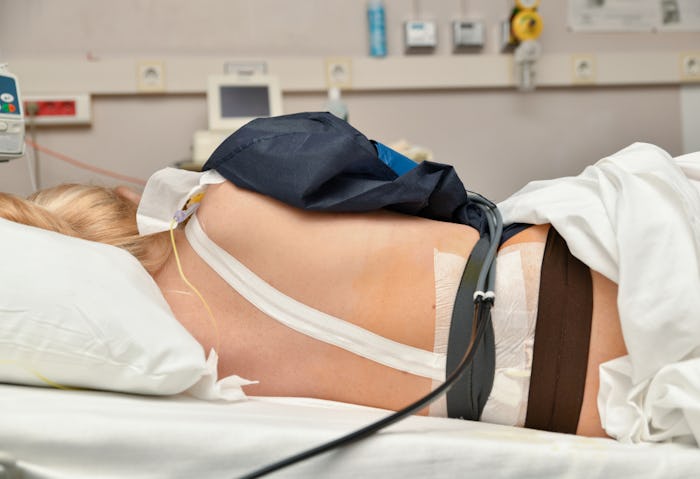Life

If You're Worried That An Epidural Will Increase Your C-Section Risk, Don't Be
When creating a delivery plan, most expectant moms run into the whole epidural question. Chances are, you have a million considerations about epidurals and their effect on delivery. For instance, do epidurals increase the risk of C-sections, or is that just an outdated idea? To learn more, Romper spoke with certified nurse midwife and family nurse practitioner Miri Levi who provides women’s healthcare, breastfeeding support, and family care in her private practice in Anacortes, Washington.
At this time, there is conflicting information about whether epidurals increase the likelihood of getting a Cesarean section. A lot of the research says no. For example, getting an epidural did not appear to increase the likelihood of needing a C-section in a study of 750 pregnant females, according to The New England Journal of Medicine. Plus, the American Congress of Obstetricians and Gynecologists supports the opinion that epidurals do not increase the likelihood of C-sections, according to the journal Obstetrics and Gynecology. But when it comes to an individual's experience of having a baby, there are a few more factors to keep in mind.
As an example, getting an epidural can decrease the strength of contractions which can slow down the labor process, Levi explains. To get things back up to speed, intravenous oxytocin is sometimes administered. But in some cases, the introduction of oxytocin may cause changes in the baby's heart rate that indicate stress, making a C-section more necessary, according to Levi.
That said, additional factors might influence the decision to get an epidural as well. They can offer a wonderful amount of pain relief for people in labor, but epidurals do require a few restrictions. For instance, many people are not supposed to walk, eat, or drink normally after getting an epidural, as Levi explains. Because the epidural can weaken your legs, it isn't safe to get up and walk around for the most part, as explained in Allina Health. And depending on the hospital, laboring patients are not permitted to eat or drink much of anything actually, just in case they need emergency surgery with general anesthesia, according to Evidence Based Birth. This means only ice chips or clear liquids may be available to you until you deliver your baby, so you should definitely consult with your hospital if this is a concern to you.
OK, so what is a mom-to-be supposed to do with all this info? As Levi explains, it is important to remember many of the big decisions about birth are in your hands. "When a woman is considering an epidural, she should think about what kind of experience she'd like to have for her labor and birth," says Levi. "If she wants to be able to move around in labor, limit medical interventions or eat and drink in labor, then she may want to consider utilizing non-pharmacologic pain medication options like walking, taking a shower or bath, aromatherapy, and massage instead of an epidural." If this idea sounds cool, then have a chat about these alternative pain management options with your obstetric provider.
Of course, if the mom-to-be is open to medical treatments and does not want to experience the pain of contractions, then an epidural may be the right decision. The choice is up to you. "Choosing an epidural is a personal choice that every woman has to make for herself after weighing the risks and benefits of the treatment. A woman can have a wonderful birth experience with or without an epidural depending on her wishes for her labor and birth," says Levi. Once a person understands the risks, benefits, and alternatives to an epidural, then it is much to decide whether it fits into the birth plan.
After a very frustrating first birth experience, this Deaf mother wanted a change. Will the help of two Deaf doulas give the quality communication and birth experience this mom wants and deserves? Watch Episode Four of Romper's Doula Diaries, Season Two, below, and visit Bustle Digital Group's YouTube page for more episodes.